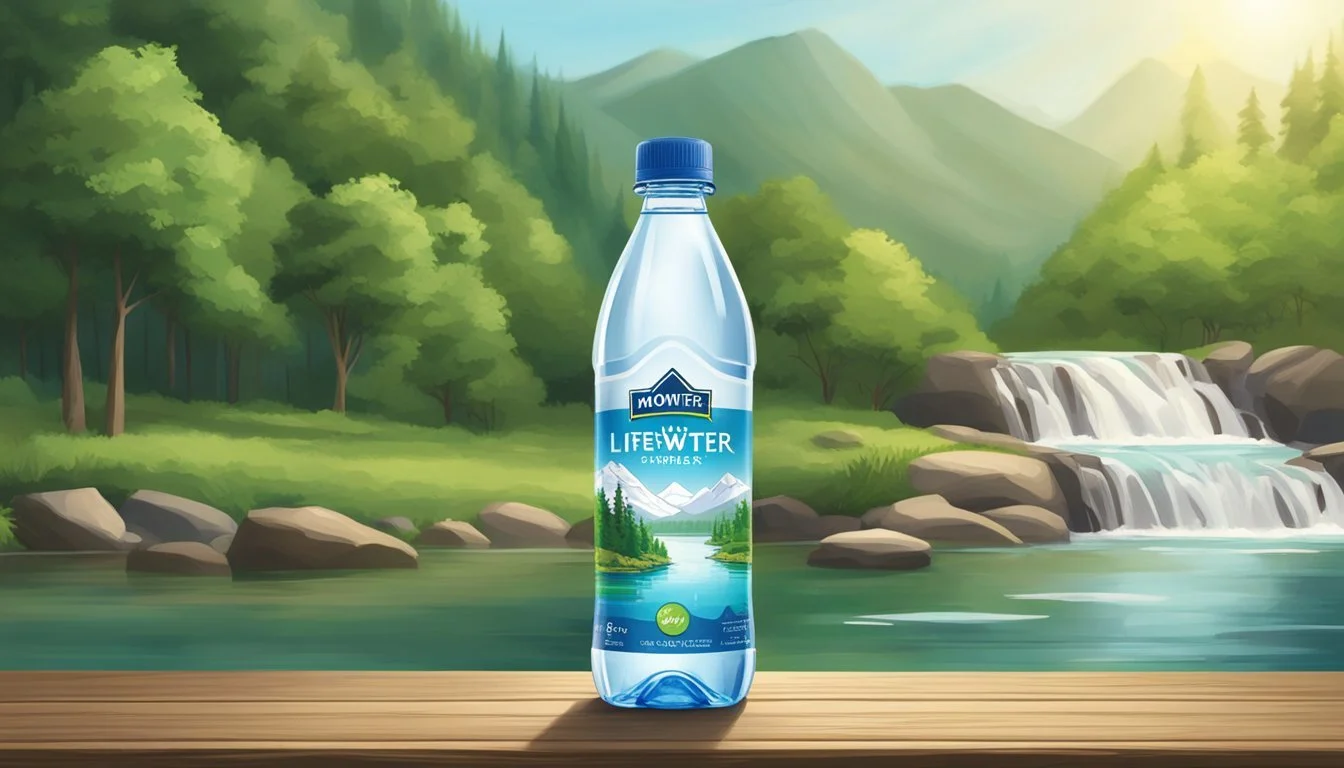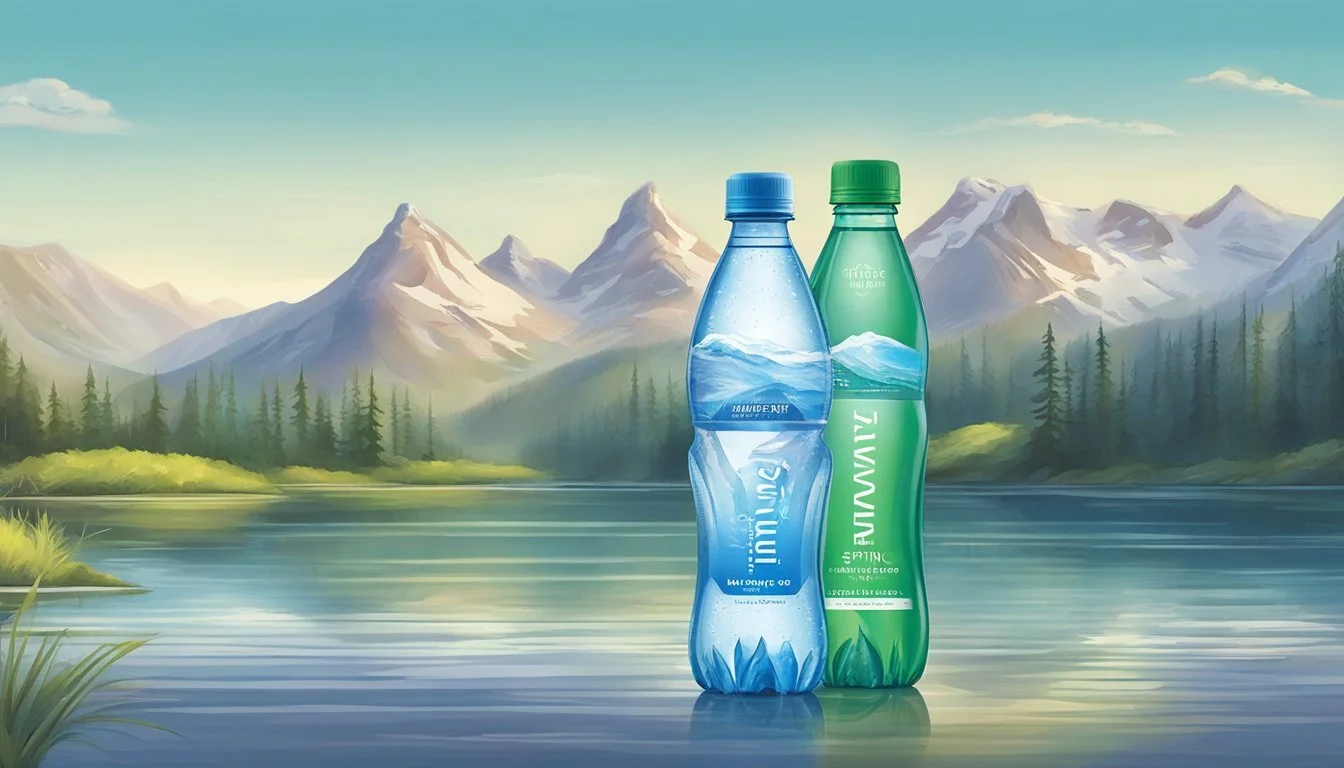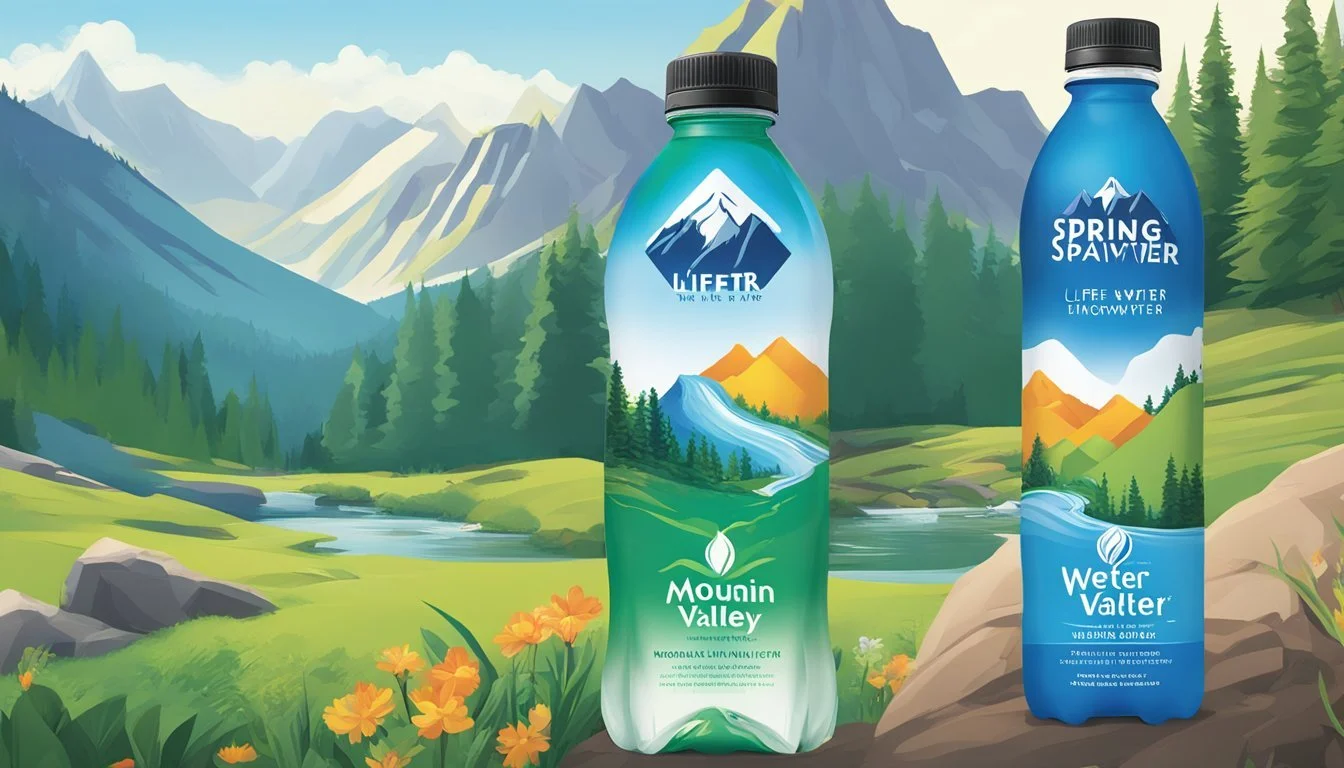LIFEWTR vs. Mountain Valley Spring Water
Comparing Quality and Taste
In the realm of premium bottled water, LIFEWTR and Mountain Valley Spring Water emerge as two distinguished brands, both commanding their own loyal followings and touting unique selling points. LIFEWTR, a brand under the PepsiCo umbrella, is known for its purified water that is pH balanced with electrolytes added for taste. Its sleek, artistic packaging distinguishes itself on the shelves, aiming to inspire creativity in its consumers with every sip.
Mountain Valley Spring Water, on the other hand, is touted for its natural purity, having been sourced from a spring in Arkansas since 1871. The brand prides itself on offering water that not only refreshes but also provides a taste of its natural origin, with a unique mineral composition that pleases the palate without enhancement. With its long history and commitment to natural spring water, Mountain Valley is often heralded for its velvety texture and clean finish.
Choosing between these two brands often comes down to individual preferences for taste and source. While some consumers might lean towards the added electrolytes and modern branding of LIFEWTR, others prefer the traditional and natural aspects of Mountain Valley Spring Water. Through an exploration of the characteristics of both brands, shoppers can make well-informed decisions to suit their personal hydration needs.
Analyzing the Water Sources
When considering LIFEWTR and Mountain Valley Spring Water, the quality and characteristics of their sources are essential factors. The origin, natural filtration, and types of sources each brand utilizes play pivotal roles in defining the purity and taste of the water.
Origin and Geography
LIFEWTR sources its water from public water supplies, undergoing purification through a rigorous process to meet its standards. The company does not explicitly link its water to a specific geography, focusing instead on the art and design aspect of the brand.
Mountain Valley Spring Water, on the other hand, boasts a single-source origin, emanating from a natural spring in the Ouachita Mountains of Arkansas. This region is known for its pristine natural environment, contributing to the premium quality associated with the brand.
Natural Filtration Processes
The water from Mountain Valley Spring Water passes through layers of rock which naturally filter it and imbue it with minerals. The company takes pride in its water being naturally alkaline and rich in calcium, magnesium, and potassium, bottled at the source since 1871.
In contrast, LIFEWTR employs a multi-step purification process that includes reverse osmosis and UV treatment. Although starting as municipal water, these methods ensure that LIFEWTR's final product is purified and free from added substances or impurities.
Types of Sources: Springs vs Underground Aquifers
Mountain Valley Spring Water comes from a natural spring, a renewable source fed by rainfall percolating down through geologic formations. Natural springs are often valued for their mineral content and natural filtration qualities.
LIFEWTR's approach involves sourcing from various underground aquifers and municipal sources. The water is then subjected to a comprehensive treatment process to achieve the desired purity and taste. This method is not reliant on natural geography but instead focuses on technological purification to attain a consistent product.
Water Quality and Purity
When debating between LIFEWTR and Mountain Valley Spring Water, one must consider the nuances of water quality and purity, which involve mineral content, pH levels, and the presence of contaminants. Each brand brings a distinct profile that can cater to different health preferences and tastes.
Mineral Content and Health Benefits
LIFEWTR is purified water enriched with electrolytes for taste, including magnesium sulfate, potassium bicarbonate, and calcium chloride. These minerals can offer benefits such as improved hydration and muscle function. Mountain Valley Spring Water, sourced from Arkansas, is naturally mineral-rich. It contains calcium, magnesium, and other trace minerals that are beneficial for bone health and metabolic functions.
Mineral Content Comparison:
LIFEWTR: Added electrolytes for enhanced taste.
Mountain Valley: Natural minerals from the spring source.
PH Levels and Alkalinity
The pH level of water can impact its taste and compatibility with the human body. LIFEWTR boasts a slightly alkaline pH, which they claim can help to balance the body's acidity. Mountain Valley Spring Water typically has a naturally occurring, slightly alkaline pH that hovers around 7.8 to 8.0, potentially providing a crisp and refreshing taste.
pH Level Summary:
LIFEWTR: Slightly alkaline.
Mountain Valley: Naturally alkaline; usually around 7.8 to 8.0.
Testing for Contaminants
Both LIFEWTR and Mountain Valley Spring Water follow the guidelines of the EPA (Environmental Protection Agency) for water quality and testing. They test regularly for contaminants, ensuring their bottled water meets the required health standards. LIFEWTR uses reverse osmosis to reduce the total dissolved solids (TDS) level, ensuring the product is pure. Mountain Valley Spring Water prides itself for being sourced from a single spring, with a natural filtration process that helps maintain its purity.
Testing Highlights:
Both brands align with EPA standards for testing.
LIFEWTR employs reverse osmosis for reducing TDS, ensuring purity.
Mountain Valley boasts a natural filtration process that maintains the water's pure state.
Taste Profile
When deciding between LIFEWTR and Mountain Valley Spring Water, one should closely consider the taste profiles of each brand, which are influenced by their unique sources and mineral compositions.
Comparing Palate Notes
LIFEWTR prides itself on its purified taste. It often presents a clean and smooth flavor palette devoid of specific mineral influences due to the purification process it undergoes. On the other hand, Mountain Valley Spring Water is acclaimed for its crisp taste that carries subtle sweet and fruity notes. This flavor is attributed to the natural minerals the water gathers as it flows through the earth in Arkansas.
LIFEWTR: Smooth, purified, neutral
Mountain Valley Spring Water: Crisp, slightly sweet, complex
Influence of Minerals on Flavor
The mineral content in water greatly affects its overall taste. LIFEWTR, typically showcasing a lack of mineral flavor, appeals to those who prefer a clean and pure tasting water. In contrast, Mountain Valley Spring Water's taste is enhanced by its naturally occurring minerals, which can impart a slight sweetness and a complex taste profile, making for a water that's both refreshing and distinct.
LIFEWTR: Low mineral influence, pure taste
Mountain Valley Spring Water: Rich in minerals, subtle sweetness and depth
Packaging and Environmental Impact
When comparing bottled water brands like LIFEWTR and Mountain Valley Spring Water, it's essential to assess both the packaging materials used and the brands' sustainability efforts as they significantly impact the environment.
Bottle Types and Materials
LIFEWTR bottles are made from PET plastic, which is BPA-free, designed to be 100% recyclable. The company emphasizes the importance of recycling their products to lessen environmental impact. On the other hand, Mountain Valley Spring Water is notable for offering its product in reusable glass bottles, which aligns with a more traditional and potentially environmentally friendly approach, given the glass bottles' longer lifecycle and recyclability.
LIFEWTR: PET plastic, BPA-free, 100% recyclable
Mountain Valley: Reusable glass bottles, high recyclability
Sustainability Practices
LIFEWTR is a brand produced by PepsiCo, which has broad sustainability goals such as reducing virgin plastic usage and investing in recycling infrastructures. Mountain Valley Spring Water, through its offering of glass bottles, has a unique advantage in sustainability, as glass can be recycled indefinitely without loss of purity or quality. Mountain Valley has not only committed to protecting its water source but also stresses its dedication to eco-friendly practices and protection of the planet.
LIFEWTR: Part of PepsiCo, aims for reduced virgin plastic usage, supports recycling
Mountain Valley: Focus on protection of source, long-standing commitment to environmental sustainability, promotes glass bottle reuse and recycling
Both brands illustrate distinct approaches to environmental responsibility within the bottled water industry.
Brand Overview and Ethos
When comparing LIFEWTR and Mountain Valley Spring Water, it's essential to consider both brands' market positions and their commitment to delivering high-quality products.
Market Presence and Consumer Trust
LIFEWTR has made a name for itself not only through its product but also by acting as a platform for artists by featuring their work on its bottles. This approach has resonated with consumers, particularly those who value creativity and social engagement. Their market presence is bolstered by the support of their parent company, PepsiCo, which has a robust distribution network.
On the other side, Mountain Valley Spring Water holds a storied legacy dating back to 1871 and takes pride in its source—a natural spring in the Ouachita Mountains of Arkansas. The brand commands respect among bottled water enthusiasts and has earned consumers' trust through its long history and consistent delivery of a product that many regard as both pure and of high quality.
Company Commitment to Quality
Both companies place a significant emphasis on the quality of their water. LIFEWTR stresses the purification process it employs, ensuring water that is not only pure but also pH balanced with electrolytes added for taste. They strive for a crisp and clean taste in every bottle.
Conversely, Mountain Valley Spring Water is celebrated for its natural mineral content and taste, attributes directly related to its unique source. The company emphasizes its commitment to the environment by packaging its product in recyclable glass and BPA-free plastic bottles, aligning itself with consumers' growing environmental concerns. The core of their ethos revolves around providing an untouched and unspoiled product – straight from nature to the consumer.
Health and Safety Regulations
When evaluating bottled waters such as LIFEWTR and Mountain Valley Spring Water, understanding their adherence to health and safety regulations is essential. This includes their compliance with EPA standards and results from independent testing.
Compliance with EPA Standards
The Environmental Protection Agency (EPA) sets legal limits on over 90 contaminants in drinking water. To meet these standards, bottled water companies implement rigorous purification procedures. LIFEWTR ensures its water meets all EPA standards, employing advanced filtration and purification processes. On the other hand, Mountain Valley Spring Water offers natural spring water which also complies with established EPA regulations for water safety. Both brands are members of the International Bottled Water Association (IBWA), adhering to the bottled water Model Code, which collectively can be more stringent than the EPA's standards.
Key EPA Regulated Contaminants:
Microorganisms: to reduce health risks from microbial pathogens.
Disinfectants: compliance ensures safe levels of chemicals used to control microbes.
Disinfection Byproducts: byproducts of chemical disinfection must remain at safe levels.
Inorganic Chemicals: includes toxic metals such as arsenic, lead, and cadmium.
Radionuclides: ensures radioactive elements remain at safe levels.
Independent Testing Results
Independent testing serves as a third-party verification to help ensure bottled water products are safe for consumption and meet all health standards. Reports indicate that both LIFEWTR and Mountain Valley Spring Water undergo independent testing regularly. Tests for heavy metals and other contaminants are part of the routine assessments. While specific results may vary, historically, these brands have been found to maintain levels of arsenic, lead, and other potential toxins well within EPA and IBWA guidelines. Independent tests bolster consumer confidence, demonstrating a company's dedication to providing a high-quality product.
Areas of Focus in Independent Testing:
Chemical Analysis: Verification of absence or safe levels of organic and inorganic chemicals.
Microbial Testing: Ensuring no presence of harmful bacteria, viruses, or protozoa.
Radiological Examination: Confirming radionuclide content is within acceptable limits.
Consumer Experience
When selecting bottled water, consumers typically consider accessibility and price as key factors. The experience varies significantly between LIFEWTR and Mountain Valley Spring Water, particularly in the context of market accessibility and cost.
Accessibility in Markets
LIFEWTR, a premium brand of purified water that is pH balanced with added electrolytes, prides itself on its availability. Consumers find it in most grocery stores, convenience stores, and online retailers across the nation. This widespread distribution makes LIFEWTR highly accessible to a broad customer base.
Mountain Valley Spring Water, on the other hand, is known for its source in the Ouachita Mountains and a history that dates back to 1871. Although it's less ubiquitous than LIFEWTR, it maintains a solid presence in specialty food stores and is available for direct delivery in certain areas.
Price Comparison
The price point between these two brands is a discernible factor for consumers. Generally, LIFEWTR falls into the more affordable category, which suits budget-conscious shoppers looking for quality hydration.
Brand Price Range Per Bottle (Typical 500ml bottle) LIFEWTR $1.50 - $2.50 Mountain Valley $1.75 - $3.00
Mountain Valley Spring Water is marketed as a premium brand and tends to be more expensive. The price reflects its heritage, glass bottling, and the natural spring source, making it a luxury item in the bottled water market.
Final Verdict
In deciding between LIFEWTR and Mountain Valley Spring Water, consumers should consider purity, taste, and mineral content. This verdict will break down the choice based on an objective comparison and tailored recommendations.
Comparison Summary
LIFEWTR boasts a determination to support arts and creativity, featuring rotating bottle designs by emerging artists. It positions itself as a premium purified water, pH balanced with electrolytes added for taste. Mountain Valley Spring Water, on the other hand, is celebrated for its natural mineral content and a history dating back to 1871. It emerges from a spring in Arkansas and prides itself on its natural purity and refreshing quality.
In the realm of taste and refreshment, individual preferences play a key role:
LIFEWTR: Smooth and enhanced with electrolytes.
Mountain Valley: Natural, lightly sweet with a distinctive mineral profile.
Purity levels also differentiate these brands:
LIFEWTR: Purified through rigorous processes, including reverse osmosis.
Mountain Valley: Naturally pure, hailing directly from a spring with minimal processing.
Recommendations for Different Needs
For those seeking an electrolyte-infused drink that may help with hydration, LIFEWTR is a suitable choice. It could appeal to individuals who place a premium on added electrolytes for taste or hydration purposes.
For consumers prioritizing natural mineral intake and a legacy of purity, Mountain Valley Spring Water is the best bottled water. Its source and minimal processing ensure a clean and clear taste that many find uniquely refreshing.
Ultimately, the choice hinges on whether one values the addition of electrolytes and artistry, or the natural composition and taste of spring water with a storied tradition.









